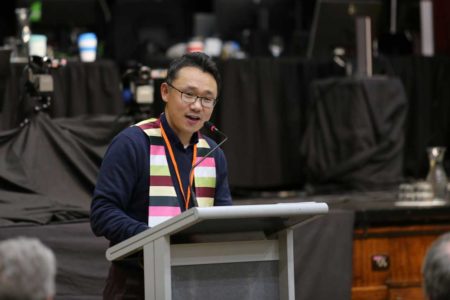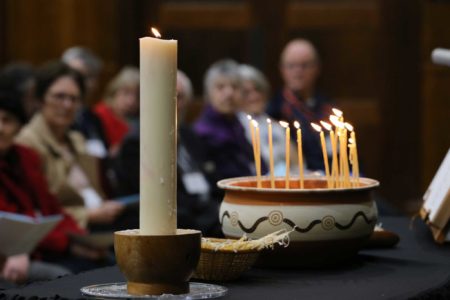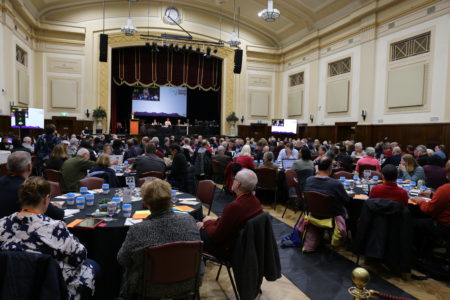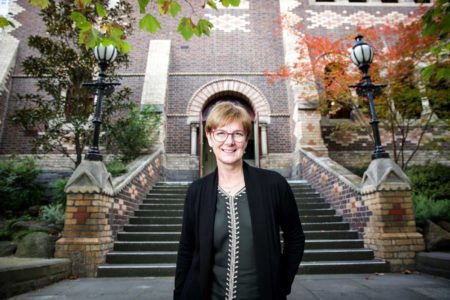Day 3 included Agency and Assembly reports, NAIDOC Week presentations and the adoption of a Statement of the Heart.
The first report was presented by CEO Paul Linossier and Bronwyn Pike. Paul touched on the many important services Uniting Vic.Tas provides, which were:
- Aged and other carer
- Alcohol and other drugs
- Early learning
- Child, youth & families
- Disability & mental health
- Resilient communities
- Business & social enterprises
- Employment
“As one of the largest community service organisations in Victoria and Tasmania, with a stated purpose to confront injustice, our advocacy and social justice work is a core part of what we do,” he said.
The Assembly report was presented by UCA president Deidre Palmer and general secretary Colleen Geyer.
Deidre said the 15th Assembly last year made some important decisions, including two statements of belief on marriage, a commitment to respond to the issue of domestic and family violence and an affirmation of the sovereignty of Aboriginal and Torres Strait Islanders.
“An important guide for us is the Assembly Strategic Plan,” she said. “This plan frames the work we do and provides transparency. In it, we have four directions:
- Live out a joyful faith. This focuses on inspiring and renewing our faith and ministry. We have vibrant communities of young adults and young adult leaders, including in our culturally and linguistically diverse congregations and conferences.
- Grow with God. A number of national cooperation and collaboration initiatives have been enacted. One is the National Executive Development Program which provides executive leadership skills for current and potential leaders.
- Be a voice for justice. Work is underway to prepare a National Climate Action Plan to resource us all to take action on climate change. We are also working to raise awareness of conditions for seasonal workers, particularly in vulnerable communities.
- Journey as one Uniting Church. One example is our response to the Royal Commission into Institutional Responses to Child Sexual Abuse.”
In closing, Deidre shared some of her hopes for the future of our church. They were:
- Committing to evangelism in culturally appropriate ways.
- Forming and growing in Christian discipleship for all ages
- Developing young leaders
- Building intergenerational Christian community.
Uniting AgeWell CEO Andrew Kinnersly said the organisation worked with about 7000 older people across metropolitan and regional Victoria and Tasmania to help them stay as well as possible, and live full and rich lives. This work was infused with the Christian faith tradition.
“Along with operating residential care, the organisation offers tailored home care, allied health and therapy services, carer support and respite services, social support, transitional care and independent retirement living options so individuals can access care at any stage of their ageing journey,” he said
Andrew said the Royal Commission into Aged Care Quality and Safety established last October was a “once-in-a-generation opportunity to bring about real change in the aged care sector and the way Australia views and supports older people”.
“On 7 January, Uniting AgeWell submitted a detailed response to the Commission’s questionnaire on the quality and safety of its residential and home care package services over the preceding five years.
“On 5 March, we were fortunate to host Commissioner Richard Tracey and Commission staff to our Strathdon Community in Forest Hill for a tour of the site and general discussion.”
The property presentation was titled Changing Landscapes – Reimagining Property For Mission. Presented by eLM executive officer Jenny Byrnes it presented four scenarios for members to consider and expand on in working groups later that morning.
“Our capacity to create missional opportunities and implement innovative engagement with a world in need is now severely constrained,” she said.
“A significant amount of our resources are locked in to rigid and inflexible assets and practices that make it extremely difficult to meet the demanding needs for missional flexibility and sustainability.
“More harshly, it could be said we are failing to be effective in our stewardship – failing to fully utilise our surplus property resources for missional sustainability and flexibility.”
Jenny said the Synod was asking for capital tied to property which was surplus to missional needs be released.
“Let’s be the generation that shifts us into missional sustainability for the decades to come,” she said.
“This is the moment. Don’t think we have the time to wait for a decade. We are the ones. Don’t look to someone or somewhere else.”
The afternoon session included a report from U Ethical and presentations celebrating NAIDOC week.
The U Ethical report was delivered by chairman David Cousins and CEO Mat Browning.
David said U Ethical was “on a journey” to double its grant to the Church over five years.
“Our strategy is founded on three pillars―visibility, accessibility and performance―underpinned by ethical leadership. Implementation is well underway and progressing well,” he said.
Following afternoon tea Rev Will Pickett and Leprena centre manager Alison Overeem spoke about NAIDOC (National Aborigines and Islanders Day Observance Committee) Week and what it means for First Peoples.
Will explained the origins of NAIDOC in the calls by Indigenous activist William Cooper to have a day of mourning in recognition of the effects of colonisation on the First Peoples and for churches to have annual days devoted to sermons and prayers also devoted to this.
“NAIDOC reminds me that I am part of a proud people who have suffered so many injustices and our trauma has impacted generationally,” Will said.
Will said he had officiated at the funeral an Aboriginal teenage boy who drowned in Perth’s Swan River fleeing police last year.
“Our generation of young people are still waiting for justice in our land,” Will said.
However, Will said there could be a new day dawning if Indigenous voices were listened to and the truth spoken leading to action.
“I believe there will be a treaty that benefits all people of this sacred land of Australia,” he said.
Alison said she embraced NAIDOC “and beyond”.
“NAIDOC must be much, much more than a week in July we celebrate every year,” she said.
Alison said the work of hearing Indigenous voices, speaking the truth and pursuing a treaty should be the Church’s “core business” in all that it does.
She called for the “stories of voice, treaty and truth to sit quietly and gently within every one of us, in each presbytery, in each Synod and in the hearts of every congregation and church council”.
Two proposals were then brought before Synod by the Ministry and Mission Committee.
The first was that Synod support the 2017 Statement of the Heart made at Uluru as the preferred pathway towards reconciliation.
After some discussion over wording it was adopted by consensus.
A proposal for Synod to urge the Federal Government to expand and give preference to the Seasonal Worker Program and the Pacific Labour Scheme to employ temporary workers from the Pacific on Australian farms was deferred to a later time.
Ecumenical Relations Committee member Rev Peter Weeks then presented the Ecumenical Award, which recognises initiatives in promoting ecumenical activities.
The award was won by the Kaniva Youth Group, which is led by members of the Serviceton Uniting Church and meets at the Kaniva Church of Christ.
The youth group organises activities, intriguingly including ‘mud soccer’, that involve young people from a number of denominations and those of no faith.
Unfortunately the youth group members were unable to attend Synod as they were in camp but Andrew Boatman, chairperson of the Presbytery of Western Victoria, accepted on their behalf.
The evening session was devoted to discussion of Synod’s Response to Voluntary Assisted Dying Legislation in Victoria.
For the final time Synod heard from the five young adults tasked with providing theological reflection at the end of each day.
Sione Hehepoto, Joy Han and Kelly Skilton spoke on this occasion.
They outlined how Synod had posed the question of asking who the people of God are in changing times.
“The church is moving and it looks different to what it used to be,” Kelly said.
“We are in a different space, a different paradigm, where our community looks different, the body of Christ looks different and our mission looks different.”
Kelly said it was into this context that “God enters into our expressions of great love and suffering, right into our midst and births new life”.
After the reflection, Moderator Denise Liersch thanked the group, that also included Cam Shields and Melanie Morris, and gave each a gift.
“We have been blessed, deeply blessed,” Denise said of the group’s contribution to Synod.
To find out what happened on day two of Synod click here.
For more detail on all of today’s activities log on to the Synod app at https://event.crowdcompass.com/victassynod2019
Receive live updates by following our Twitter hashtag #victassynod2019





